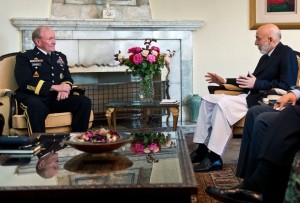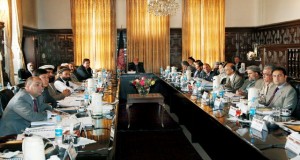US Grabs Pakistan Taliban Representative From Afghan Authorities, Preventing Peace Talks
Afghan President Hamid Karzai recently lashed out at the United States, stating that US insistence on being able to conduct autonomous counterterrorism actions within Afghanistan was a major obstacle to signing a new Status of Forces Agreement (okay, they call it the Bilateral Security Agreement now, but SOFA just has a much better ring to it). A report from the Washington Post yesterday evening provides a perfect example of how the hypocrisy of US forces in Afghanistan is killing any chance of an agreement being signed, as the US consistently brags about Afghans being “in the lead” on virtually all actions and yet when the US wants, it takes arbitrary and brutal action with complete disregard for the Afghan chain of command.
The hubris of this latest insult to Afghanistan is staggering. After months of carefully recruiting a senior figure from inside Pakistan’s Taliban, Afghan intelligence officials were in the process of bringing him into Afghanistan where he was to begin discussions with the security service that could lead to peace talks. It appears that the US stopped the convoy transporting him, grabbed him, and took him to the portion of the prison at Bagram that the US still refuses to turn over to Afghan control:
The United States recently seized a senior Pakistani Taliban commander in eastern Afghanistan, snatching him from the custody of Afghan intelligence operatives who had spent months trying to recruit him as an interlocutor for peace talks, Afghan government officials charged Thursday.
Latif Mehsud, an influential commander in the Pakistani Taliban, was taken into custody by U.S. personnel, who intercepted an Afghan government convoy in Logar province, Afghan officials said.
As might be expected, Karzai is furious. Karzai’s spokesman talked to the Post:
Afghan officials described their contact with Mehsud, thought to be about 30, as one of the most significant operations conducted by their country’s security forces. After months of conversations, the Taliban leader had agreed to meet with operatives of Afghanistan’s main spy agency, the National Directorate of Security, said Aimal Faizi, a spokesman for Karzai, who declined to identify Mehsud by name, referring to him only as a top Taliban commander.
/snip/
“The Americans forcibly removed him and took him to Bagram,” said the spokesman, referring to the military base that includes a detention facility where the United States continues to hold more than 60 non-
Afghan combatants.
There is simply no way that the US could have thought that Mehsud was in Afghanistan to carry out a terrorist attack. He was in a convoy of NDS personnel and word has been spreading that the Pakistan Taliban is interested in peace talks with Pakistan, so the concept of peace talks with Afghanistan also would make a lot of sense.
Keep in mind as well that, even though the drone strike on Wali Ur Rehman was seen by most as revenge for his role in the Khost bombing, Rehman was seen as one of the more moderate voices within the Pakistani Taliban who would have favored peace talks. The Taliban quickly called off the prospect of peace talks after Rehman’s death. Recall that his death came just as Nawaz Sharif, who had campaigned on a platform including peace negotiations with the Taliban, was preparing to take office.
It goes without saying that Pakistan’s Taliban is one of the most violent and disgusting organizations in existence. Continued attacks on polio vaccine workers and threats to attack Malala Yousufzai again if she returns to Pakistan and continues her activism for young girls to have equal access to educational opportunities show them to be the worst kind of terrorists. And yet, somehow, the US has seen fit twice now to intervene and remove from the playing field the voices within this group who seemed in the best position to help lead it out of its most extreme actions and closer to a peaceful position within society.
Somehow, US actions in Pakistan and Afghanistan seem to indicate that the US does not feel that peace talks in the region are in its best interests. What harm would come to the US from peace talks?


